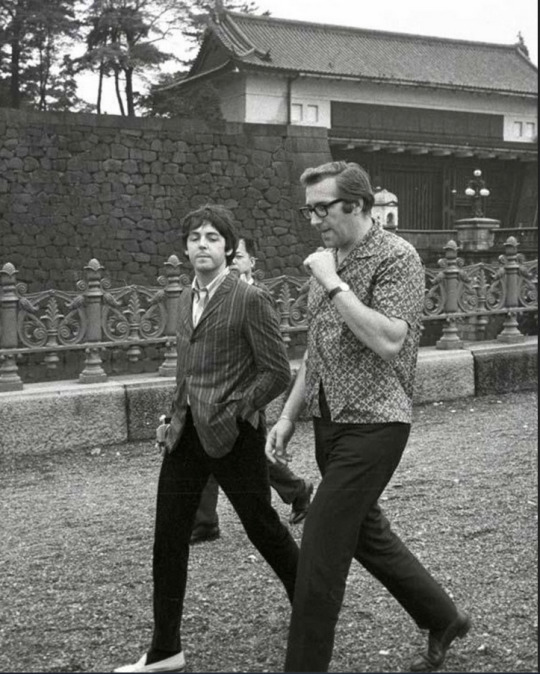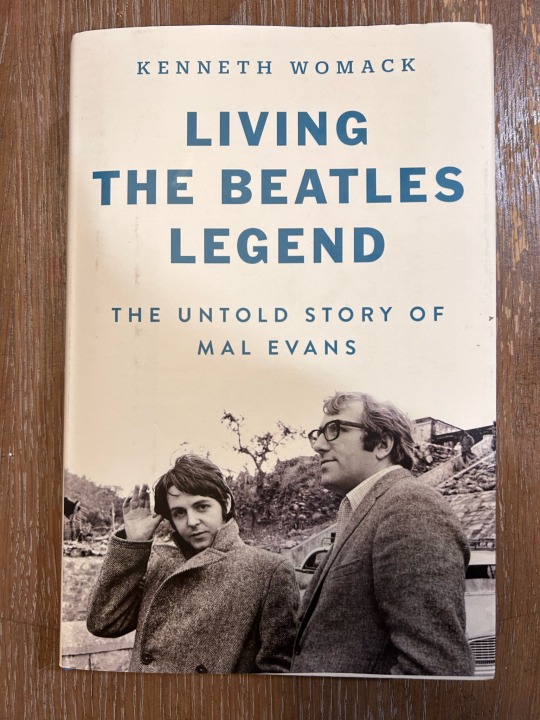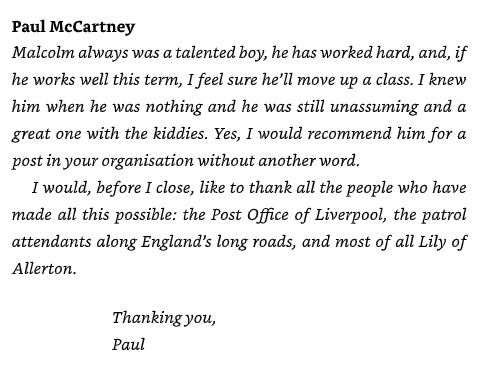#Living the Beatles Legend
Text
John Lennon always comforted people who were grieving because he knew the feeling so well:
"There was one thing about John Lennon. In his steel-trap mind, he never forget what was important to people. Fast forward to May 1975. I had become an anchorman in Philadelphia, and combined with a radio station, our TV station sponsored what was called the "Helping Hand Marathon", a weekend-long radio fund-raiser to benefit area charities, including the one most important to me, the battle against multiple sclerosis (n/t: Larry Kane's mom passed away in 1964 because of sclerosis). With the help of our sales manager, Gene Vassall, I was able to put together a real coup — John Lennon to cohost the marathon for the weekend. From the time I picked him up at the railroad station to his departure on Sunday night, John was sensitive, giving and tireless. On the phone days ahead of the event, he said "Larry, I know this is being done in memory of your mother. I will make this happen and it will be great, baby!".
ㅡ Larry Kane in the book "Memories of John Lennon" by Yoko Ono.
"I've always admired him, and was very proud of the friendship we had together, and the first time John really showed his love for me was after Stuart's death, when he helped me such an awful lot to try and understand my loss —and his as well — and we used to talk about Stuart, and he really got me together again. He wasn't like Paul or George, who felt really sorry for me, and said "Oh, everything will be fine". John just said — it to me one day when I was really, really down and didn’t know what to do — he said "Well, you have got to decide what you want: Do you want to live or do you want to die? Decide that, but be honest". And that helped me tremendously to go on. And then he said that there are so many things we haven't even discovered yet, and life has got to go on, and you can't sit down and cry all the time, you have got to get on, and if it's not for me, he said, it's for Stuart. And he said that in a very harsh voice, not like nice and sweet, but very directly, so that was the real John who was talking. And that made me really think twice about it. It
helped me tremendously. That is what I'm still thankful for (...)"
ㅡ Astrid Kirchherr in the book "Memories of John Lennon" by Yoko Ono.
"While they were there, Lily's father, William White, succumbed to a heart attack at age sixty-seven. Over the past few years, Mal had shared with her how intimidating John could be, so Lil was surprised when the Beatle brought her a cup of tea, let down his guard, and showered her with consolation. Like Mal, Lily would always remember John's tender gesture. 'It's very hard at times like these to give verbal comfort to anybody,' Mal wrote, 'but John was fantastic, and I knew that he gave Lil a lot of comfort in her hour of need — something I have always blessed him for.'"
ㅡ Mal Evans in his diary, from the book "Living The Beatles Legend" by Kenneth Womack.
#john lennon#the beatles#60s#yoko ono#mal evans#larry kane#astrid kirchherr#memories of john lennon#living the beatles legend#kenneth womack#my:read#john.......#the man that you were#:')
199 notes
·
View notes
Text
"the Beatles' penchant for raucous, late-night merrymaking seemingly came to an end during the European tour, with the boys sometimes retiring for the night as early as eight o'clock on their off days, often ignoring their usual scrum of adoring female fans."
June 1965 - Living the Beatles Legend
sorry was nobody going to mention that Mal told us nearly the exact date that the Beatles stopped fucking girls and started fucking each other?
#weird timing to be fair - to me at least - ymmv#give me twenty guesses about when the fucking started#and I wouldn't get close to June 1965#but here we are.#mal evans#mclennon#beatles books#living the beatles legend
193 notes
·
View notes
Note
Hold up ,,, Mal called Paul his love in his diaries?
Yes. In his autobiography. He also analyzed their relationship in his diaries.
For some context, here's a longer passage from Ken Womack's book, Living the Beatles Legend (Chapter 31).
As January 1970 came to close, Mal began drifting into an emotional slide that has been developing over the past several years. "Seem to be losing Paul," he wrote on January 27. "Really got a stick from him today. He let me down," and ominously added "Fixing a hole," "Pepper," and "directorship" to a growing list of disappointments. Apparently, the conversation had turned yet again to the issue of Mal's servile role in Paul's life, with the roadie believing that the association was bounded by friendship and love. "A servant serves," Mal wrote, "but he who serves is not always a servant," he added, echoing John's philosophy from December 1968. "Love is as sharp and piercing as a sword, "Mal reasoned, "but as the sword edge dulls — you sharpen it. So love's keenness needs honing — needs honesty." *
[...]
On February 11, Mal joined John and Yoko for a lip-synched performance of "Instant Karma!" on Top of the Pops, with the roadie, clad in beige suit and a light-green tie, playing the tambourine. By this juncture, Mal's long-standing relationship with Paul was in freefall. A few days earlier, he have been awakened by a 1 p.m. telephone call from the Beatle. It went "something like this," he wrote in his diary:
Mal: yeah?
Paul: I've got time at EMI over the weekend. Would like you to pick up some gear from the house.
Mal: Great, man. That's lovely. Session at EMI?!
Paul: Yes, but I don't want anyone there to make me tea. I have the family – wife and kids there.
Mal: [thinking to himself] Goes my poor head, "Why????" **
By the next week, Mal found himself behind the wheel of the Apple van, moving Paul's gear from EMI Studios to Morgan Studios, another Northwest London facility where Paul could work incognito. At one point, Neil cornered Mal about Paul surreptitious recording sessions, demanding to know more. "Where's Paul?" he asked, to which Mal tersely replied, "Not telling you."
In other instances, Mal ordered a Mellotron for Paul, while keeping him fully stocked with plectrums and other gear. In late February, Paul asked Mal to move everything back to EMI, where he was set to record "Maybe I'm Amazed" in Studio 2. For Mal, everything came to a head at 7 Cavendish Ave., when "my long love, Paul, to whom I have devoted so many years of loyalty, turned around to me and said, I don't need you anymore, Mal." ***
*, ** : Evans, "Diaries." [1963—1974.] 10 vols. Malcolm Frederick Evans Archives. Entries from Jan 27 & Feb 5, 1970.
***: Evans, Mal, 'Living the Beatles Legend: Or 200 Miles to Go.' Unpublished MS, 1976. Malcolm Frederick Evans Archives.

#Mal Evans#Ken Womack#Living the Beatles Legend#Paul McCartney#Mellotron#When you told me you didn't need me anymore...#Mother Malcolm comes to me
126 notes
·
View notes
Text

Newly unearthed photo of John & Paul’s last known time together?!! I’m not crying, you’re crying
#mclennon#john lennon#paul mccartney#linda mccartney#may pang#mal evans#now and then#the long and winding road#anthology#get back#living the Beatles legend
127 notes
·
View notes
Text
'Living The Beatles Legend' - Out Now
Very much looking forward to reading and reviewing Kenneth Womack’s latest – a biography on the Beatles’ ever-present minder, Mal Evans.
If you live in the USA the book is published by Harper Collins and is called Living The Beatles Legend – The Untold Story of Mal Evans. It comes with this cover:
If you’re in the UK it is also published by Harper Collins, but has a slightly different title…

View On WordPress
4 notes
·
View notes
Text
You’re telling me Living The Beatles Legend is $50… I’m gonna need you to be so serious rn.
#and after The Lyrics was $100 and excluded from all sales#So over this bs#the lyrics paperback is $30#the beatles#paul mccartney#george harrison#john lennon#ringo starr#mal evans#rob sheffield#living the beatles legend
4 notes
·
View notes
Text

Things that make me happy.....
1 note
·
View note
Text
With Mal in tow at a July 1970 summit in London—pointedly held before Phil Spector returned to the States after completing basic recording sessions for All Things Must Pass—tensions flared when John and Phil began questioning Klein about money matters. According to Ruth Ellen Carter, Allen Klein’s secretary at the time, her boss “told Spector [that] he was running the show, not him.” When John informed Klein that he had no right whatsoever to the money in question, [Klein] responded to [John] by “slapping [him] across the face, calling him several names. . . . When Mal attempted to intervene, “he was hit over the head with an umbrella” by the irate manager. Klein left soon after, “making several threats.” Carter later observed that “Mal must have exercised considerable restraint—as he could have lifted Klein off the ground with one hand and at least given him a good shake!”
-- Kenneth Womack, Living the Beatles Legend: The Untold Story of Mal Evans (p. 380)
#books: living the beatles legend#apparently this is from a 1972 affidavit that klein's secretary gave?#odd that I haven't seen this story more#did john defend klein so hard after this because he didn't want to lose face?#or because he thought this was acceptable behavior?
74 notes
·
View notes
Text

Billy Preston
Billy was entirely self-taught and never had a music lesson. By the age of ten, he was playing organ onstage backing several gospel singers such as Mahalia Jackson. Sometimes referred to as the 'fifth' Beatle, Billy accompanied the band on electric piano for its rooftop concert, the Beatles final public appearance. He also played keyboards (including piano, organ, clavinet and various synthesizers) for the Rolling Stones.
William Everett Preston died June 6, 2006 at the age of 59.
#billy preston#love#music legend#motown#applerecords#the beatles#the rolling stones#texas#arizona#june#black lives#rock and roll#soul#gospel
86 notes
·
View notes
Text

John Lennon and Paul McCartney on the "Help!" set. ㅡ From the book "Living the Beatles Legend" by Kenneth Womack.
#john lennon#paul mccartney#the beatles#60s#1965#mal evans#living the beatles legend#kenneth womack#my:read
173 notes
·
View notes
Text
I have finally trudged my way to the end of 'Living The Beatles Legend' which is a terrible name for a book and I think sincerely one of the most boring beatles books I've ever read, and I don't recommend it at all.
10 notes
·
View notes
Note
Didn’t Mal promise a fan they’d meet Paul if she had sex with him, lied after the fact and she tried to kill herself to which he joked about it?
tw: rape, suicide attempt.
This refers to an event that happened when the Beatles toured New Zealand—see: Chapter 9, "The Demon," in Ken Womack's book.
There are several versions of the event (all mentioned in Womack's book). No matter which one you believe, they all have in common that a young woman from Wellintgon (she was in her early twenties) slashed her wrists in what was almost certainly Mal's hotel room. She was rushed to the hospital, and survived.
The press, fed by Derek Taylor, painted her as a 'hysterical fan' and tried to sell her story as a cautionary tale. (Girl tries to die for the Beatles.)
George Harrison (Anthology) mentions a woman who slashed her wrists while being left behind in someone's room.
In the book The Beatles Down Under, DJ Bob Rogers claims to remember the woman having sex with someone in order to meet the Beatles, and attempting suicide when it turned out the (unnamed) man she'd slept with could or would not help her.
And Mal himself, in his autobiography, says he was not at the hotel that night, and instead spent time with the woman's mother, and that he came back to find she'd been 'gang-banged', and that she harmed herself in desperation afterwards.
None of the non-Mal sources mentions Mal by name.
This is an ugly, sad story, and I sure hope Mal did not laugh about it.
The book as a whole paints a grim picture of the Beatle years, and Mal is certainly not an heroic figure. Without making excuses for the way he treated women, including his wife, I think that he himself was a fan, who was hopelessly in love with the Beatles and Paul in particular, to a point where he was unable to escape their orbit and the rush of being 'with them', only to sink into depression when they ceased to be.
That is the cautionary tale here.
18 notes
·
View notes
Text
I Hate How She Talks About Snow White

"People are making these jokes about ours being the PC Snow White, where it's like, yeah, it is − because it needed that. It's an 85-year-old cartoon, and our version is a refreshing story about a young woman who has a function beyond 'Someday My Prince Will Come. "

Let me tell you a little something's about that "85-year-old cartoon," miss Zegler.
It was the first-ever cel-animated feature-length full-color film. Ever. Ever. EVER. I'm worried that you're not hearing me. This movie was Disney inventing the modern animated film. Spirited Away, Into the Spider-Verse, Tangled, you don't get to have any of these without Snow White and the Seven Dwarfs (1937.)
Speaking of what you wouldn't get without this movie, it includes anime as a genre. Not just in technique (because again, nobody animated more than shorts before this movie) but in style and story. Anime, as it is now, wouldn't exist without Osamu Tezuka, "The God of Manga," who wouldn't have pioneered anime storytelling in the 1940s without having watched and learned from Snow White and the Seven Dwarfs in the 1930s. No "weeb" culture, no Princess Mononoke, no DragonBall Z, no My Hero Academia, no Demonslayer, and no Naruto without this "85-year-old cartoon."
It was praised, not just for its technical marvels, not just for its synchronized craft of sound and action, but primarily and enduringly because people felt like the characters were real. They felt more like they were watching something true to life than they did watching silent, live-action films with real actors and actresses. They couldn't believe that an animated character could make kids wet their pants as she flees, frightened, through the forest, or grown adults cry with grieving Dwarves. Consistently.
Walt Disney Studios was built on this movie. No no; you're not understanding me. Literally, the studio in Burbank, out of which has come legends of this craft of animated filmmaking, was literally built on the incredible, odds-defying, record-breaking profits of just Snow White and the Seven Dwarfs, specifically.
Speaking of record-breaking profits, this movie is the highest-grossing animated film in history. Still. TO THIS DAY. And it was made during the Great Depression.
In fact, it made four times as much money than any other film, in any other genre, released during that time period. It was actually THE highest-grossing film of all time, in any genre, until nothing less than Gone With the Wind, herself, came along to take the throne.
It was the first-ever animated movie to be selected for the National Film Registry. Actually, it was one of the first movies, period, to ever go into the registry at all. You know what else is in the NFR? The original West Side Story, the remake of which is responsible for Rachel Ziegler's widespread fame.
Walt Disney sacrificed for this movie to be invented. Literally, he took out a mortgage on his house and screened the movie to banks for loans to finish paying for it, because everyone from the media to his own wife and brother told him he was crazy to make this movie. And you want to tell me it's just an 85-year-old cartoon that needs the most meaningless of updates, with your tender 8 years in the business?
Speaking of sacrifice, this movie employed over 750 people, and they worked immeasurable hours of overtime, and invented--literally invented--so many new techniques that are still used in filmmaking today, that Walt Disney, in a move that NO OTHER STUDIO IN HOLLYWOOD was doing in the 30's, put this in the opening credits: "My sincere appreciation to the members of my staff whose loyalty and creative endeavor made possible this production." Not the end credits, like movies love to do today as a virtue-signal. The opening credits.
It's legacy endures. Your little "85-year-old cartoon" sold more than 1 million DVD copies upon re-release. Just on its first day. The Beatles quoted Snow White in one of their songs. Legacy directors call it "the greatest film ever made." Everything from Rolling Stones to the American Film Institute call this move one of the most influential masterpieces of our culture.
This movie doesn't need anything from anybody. This movie is a cultural juggernaut for America. It's a staple in the art of filmmaking--and art, in general. It is the foundation of the Walt Disney Company, of modern children's media in the West, and of modern adaptations of classical fairy tales in the West.
When you think only in the base, low, mean terms of "race" and "progressivism" you start taking things that are actually worlds-away from being in your league to judge, and you relegate them to silly ignorant phrases like "85-year-old cartoon" to explain why what you're doing is somehow better.
Sit down and be humble. Who the heck are you?
#Snow White#Snow White and the seven dwarfs#snow#snow white 1937#snow white and the seven dwarfs 1937#Snow White 2024#Rachel zegler#west side story#poc#Disney#live action Disney hate#animation history#Do not go see this movie. Do not stream this movie.#Anime#anime history
5K notes
·
View notes
Text
A Beatle Book Bonanza in 2023
We appear to be in something of an avalanche of Beatle books at the moment with lots of titles either out now, about to be released, or in the longer-term pipeline.
A couple of Paul McCartney books available right now are The McCartney Legacy Volume 1 1969-73 (see our review of this terrific book here), and another new one called Paul McCartney: Music Is Ideas – The Stories Behind the Songs…

View On WordPress
#1964: Eyes of the Storm#Adrian Sinclair#Allan Kozinn#Beatle podcasts#Beatles#Beatles Books#Bruce Spizer#Charts#Kenneth Womack#Living The Beatles Legend#Luca Perasi#Mal Evans#Paul McCartney
5 notes
·
View notes
Text




Forewards for Mal's memoir provided by each of the Beatles in 1965
Living the Beatles Legend, Kenneth Womack (2013)
308 notes
·
View notes
Text
A week after taking the historic photo, Evans returned to the Santa Monica beach house on April 6, 1974, to have one of the most difficult conversations of his life. After dedicating himself body and soul to the Beatles for more than a decade, he was about to tender his resignation. It was the only way to forge his own path as a budding producer, songwriter, and talent scout. Thankfully, three of the Fab Four were in residence at the beach house that day, so he could say his farewells in person.
Girding his courage, Mal sought out John first. To his relief, the Beatle was sitting alone by a table in the living room. “I told him that I felt it was time for me to become my own person and do my own thing,” Mal later recalled. He had to admit that “doing his own thing” wasn’t entirely clear in that moment. “For too long, I had been resting on my laurels,” he told John, “not doing anything constructive for them nor myself except on a personal level, and I would never stop doing that, no matter what.” And with that, Mal braced himself for John’s reaction.
Without missing a beat, John piped up, saying, “It’s about time, Mal. I was wondering when you would come to it. You’re certainly capable of standing on your own two feet now, and I wish you all the luck in the world. If you ever need me, I’ll be there,” he continued, “and I know your songwriting will develop into a career for you.”
As it happened, Ringo’s reaction was more difficult to gauge. In Mal’s memory, the two old friends “sat together at the bottom of the garden, just lying back in the sunshine.” When Mal informed the drummer of his decision, Ringo went quiet. By contrast, Paul proved to be eminently more receptive, taking Mal in a warm embrace and saying, “Good on you, lad. I know you’ll be very successful—you deserve to be.”
That Sunday evening, [Mal] joined John, May, and a bevy of other friends for a seafood dinner at the Crab Shell, a bistro on Venice Beach. Harry was there, of course. He confided in Mal that Ringo had stayed up with him drinking well into the night and weeping as he took in the full measure of Mal’s decision. “Now that Mal’s left,” Ringo had cried to Harry, “the Beatles are really over.”
Excerpted from LIVING THE BEATLES LEGEND: The Untold Story of Mal Evans by Kenneth Womack (2023)
#poor ringo#also interesting that paul was still at the house a week later 👀#mal evans#paul mccartney#john lennon#john and paul#the beatles#ringo starr
234 notes
·
View notes